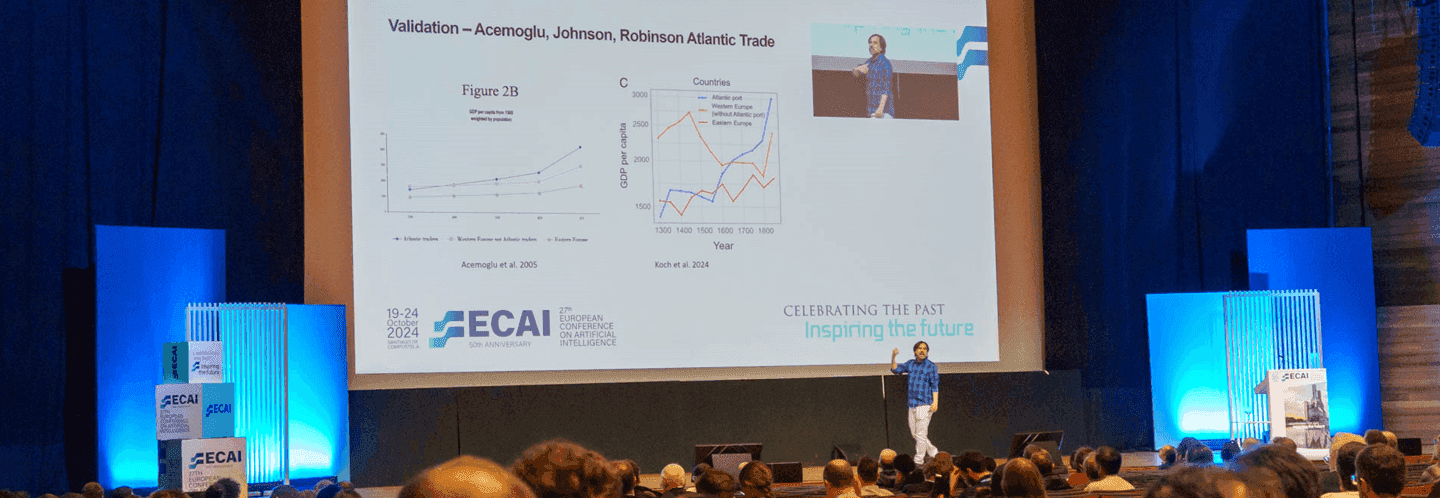
César A. Hidalgo recommends increasing "economic complexity" through the attraction, retention, and generation of knowledge
Professor César A. Hidalgo advocated today in the final plenary talk of ECAI 2024 for the "economic complexity index" as a tool to determine the growth potential of countries or regions. This indicator highlights the "attraction, retention, and generation of knowledge" and helps identify sectors where growth can be achieved through the use of Artificial Intelligence.
Santiago de Compostela, October 24, 2024. César A. Hidalgo, professor at the Toulouse School of Economics and Corvinus University of Budapest, presented today in his plenary lecture the advantages of using Machine Learning to determine the "economic complexity" level of countries or regions. This index helps identify potential weaknesses and new ideal scenarios for growth, while preserving the identity and diversity of different economic activities.
In his talk titled Economic Complexity: Using Machine Learning to Understand the Past, Present, and Future of Economic Development, presented just before the closing of the European Conference on Artificial Intelligence (ECAI 2024), which has been held in Santiago de Compostela from October 19 to today, César A. Hidalgo explained that "economic complexity development policies are essentially about the attraction, retention, and generation of knowledge".
He recommended that countries and regions aiming to "evolve from a low-complexity economy" —those reliant on just a few sectors and facing high competition in others, such as Spain or Galicia— should "engage with activities that are not their own." According to him, this process often occurs "through the migration of high-skilled individuals".
"It has been shown that when an inventor or scientist moves from one place to another, the probability increases that the destination will develop greater capacity in a specific field. This is the way to think in the context of an innovation policy, which involves the attraction, generation, and diffusion of knowledge. We need to generate new knowledge to diversify what already exists and be able to grow in that indicator," he added.
AI Contribution
Professor Hidalgo explained that "economies with a valuable portfolio are the ones with high economic complexity; they are economies that are eventually less unequal." In this context, he argued that Artificial Intelligence, through machine learning techniques, can "predict or anticipate the activities of an emerging economy or even estimate the success probabilities of those that will emerge in the future." AI also allows for the measurement of the value of activities, based on international trade data.
César A. Hidalgo explained that the loss of economic complexity can be attributed to the diffusion and democratization of knowledge or access to patents, which has allowed many countries to produce the same goods or services. To reverse this loss of competitiveness, Hidalgo recommended that "they shouldn’t do the same thing, but rather they need to do something better."
"The higher the economic complexity index of a country, the more competitiveness and economic capacity it has. It means that it produces many products and faces little competition in other territories. It has much to rely on because this diversity of knowledge and productive capacity means it is better prepared to access new activities."
As he explained, this economic complexity index is a metric that, unlike traditional international economic indicators, "helps predict and signal the path of economic evolution." "It indicates, according to the characteristics of each region, where the economic future should head if they want to raise their economic complexity. Its main goal is not to predict, but to always explain or understand. And these explanations help in developing strategic plans".
ECAI 2024
The European Conference on Artificial Intelligence (ECAI 2024), held since October 19 in Santiago de Compostela, brought together more than 1,600 delegates from around the world, representing the global elite in Artificial Intelligence research. The event, supported by the European Association for Artificial Intelligence (EurAI), the Spanish Society for Artificial Intelligence (AEPIA), and organized by CiTIUS (Singular Research Center in Intelligent Technologies at the University of Santiago de Compostela - USC, co-funded by the European Union through the Galicia ERDF 2021–2027 programme), featured a wide program showcasing the latest scientific results, conferences, debate panels, workshops, and demonstrations, highlighting the contribution of AI to the development of society.